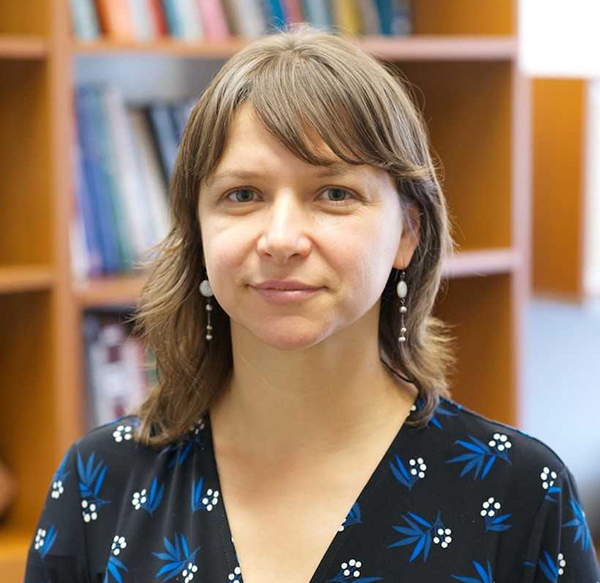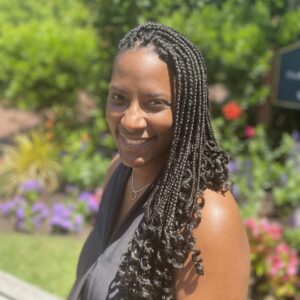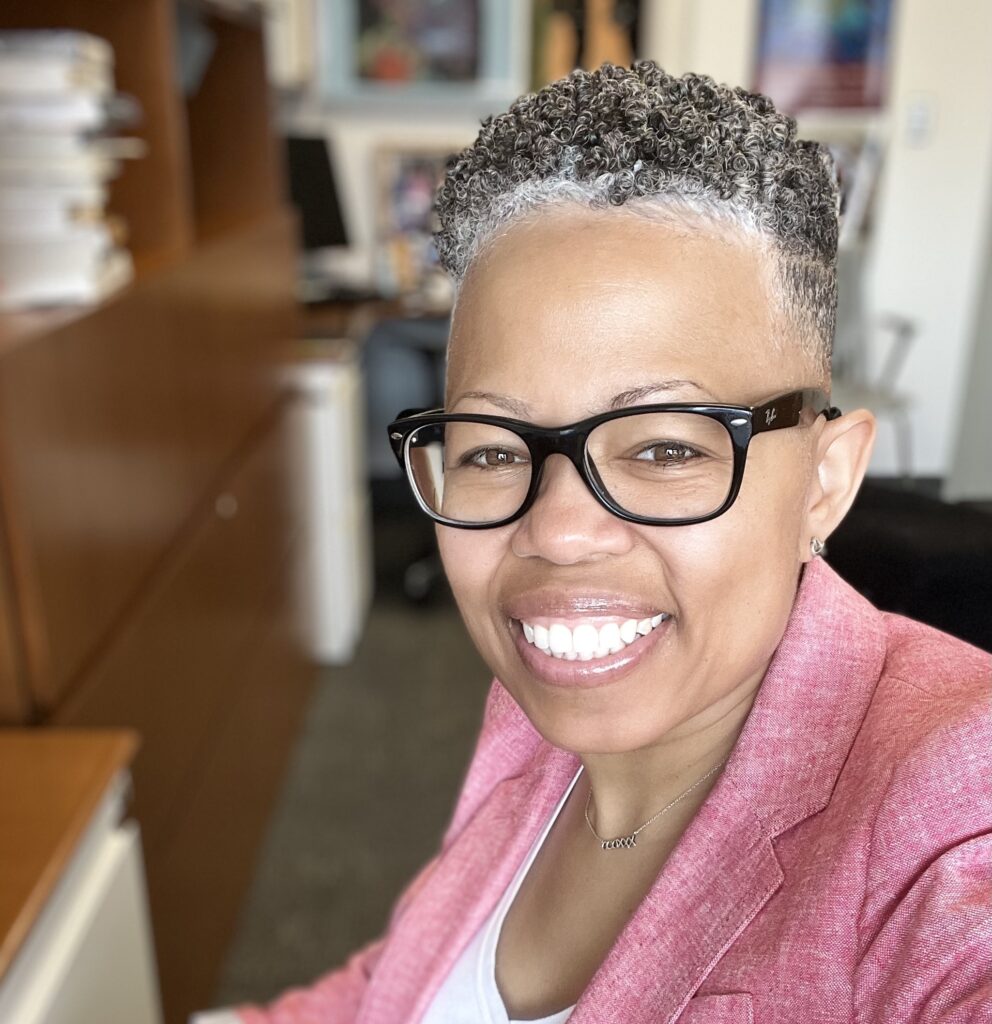
Sangeeta Bishop, Senior Principal Investigator
Sangeeta Bishop has a Ph.D. in Economics from Northwestern University. Her Ph.D. dissertation was awarded the Young Economist Essay Award by the European Association for Research in Industrial Economics. Dr. Bishop’s areas of expertise are Econometrics and Applied Microeconomics. Her Ph.D. research was a data-intensive econometrics project based on the deregulation of the German transportation system.
Her subsequent research and publications have been interdisciplinary within social science and humanities and have addressed topics such as the role of performing arts centers on college campuses in building a creative college campus, and the use of arts-based learning models in diverse fields like the social sciences and STEM. She is currently serving as senior PI and grant administrator for 2 national grants.
One is an NEH grant titled Voices and Experiences of Poverty: A New Interdisciplinary Humanities Curriculum, which aims to create a poverty focus for introducing humanities texts in order to bring cross-disciplinary studies in literature, history, and philosophy into any of our college classrooms (whether STEM or non-STEM).
The second is an NSF grant “Creating a Path to STEM Careers in Psychology for Under-Represented Minorities.” The project will develop a STEM minor curriculum in psychology informed by instructional pedagogy that promotes science-based education within the context of academic supplemental instruction, cohort models, and student support. The grant aims to study how the inclusion of a STEM minor in a Psychology degree program can increase retention, persistence to graduation and successful transfer of Underrepresented Minority (URM) students to senior college neuroscience degree programs and careers.
In addition, Dr. Bishop has over 20 years of teaching experience and involvement with student advisement and curriculum review. She has also served in an advisory capacity on doctoral dissertation committees. Since Fall 2014 Dr. Bishop has been serving as Chairperson for the Department of Social Sciences, Human Services & Criminal Justice at BMCC which is one of the largest departments at the college with 75 full time faculty and around 100 adjuncts. She has served as one of the steering committee members for BMCC’s strategic plan, member of BMCC’s Middle States Steering Committee and co-chair of Standard II: Ethics and Integrity for Middle States Standards Working Groups. She has also served as chair of BMCC’s Academic Senate for 3 years.
Janice Walters, Senior Principal Investigator
Janice Walters joined the faculty of BMCC in 2001. Prior to that, she worked in medical education where she developed cognitive intervention programs for at-risk and learning-disabled medical students, as well as participating in the development of problem-based learning curriculum and program evaluation. Dr. Walters graduated from CUNY with a B.A., major psychology, and minor sociology; CCNY with an M.S. in School Psychology; the CUNY graduate center with a Ph.D. in Educational Psychology, specializing in learning and instruction; and a Diploma of Psychoanalysis and Psychotherapy from the Derner Institute of Adelphi University. She is a licensed New York State psychologist.
Dr. Walters is an Associate Professor of Psychology in the Department of Social Science, Human Services and Criminal Justice as well as a Deputy Chair. She served as Chairperson of the Teacher Education Department for 8 years. Among other committees, she was the co-chair of the Strategic Planning Design for Success sub-committee on first year student success and co-chair of the Middle States Steering sub-committee on governance and leadership, and chair of the Distinguished Teaching Award committee. In addition, she served as vice-chair of the Academic Senate for three years.
Dr. Walters was a Co-PI on a Title V Collaborative Grant titled, “Step up to STEM” as well as a New York State Education Department grant titled, “Race to the Top.” She is currently a senior PI on an NSF grant titled, “Creating a Path to STEM Careers in Psychology for Under-Represented Minorities.” The goal of the grant is to create a STEM track curriculum within the current Psychology degree program that promotes science-based education that will lead to the successful transfer of Underrepresented Minority students into senior colleges and STEM based careers such as neuroscience and cognitive psychology.
She has published articles on the role of interest in cognitive processing, metacognition, learning strategies, and learning disabilities as well as articles and book chapters that highlight the impact of race and intergenerational trauma on psychological outcomes among indigenous peoples, and the role of race within the analytic relationship.
Dr. Walters is a member of the American Psychological Association including the sub-divisions 39: Psychoanalysis and 56: Trauma Psychology, the Westchester Society for Psychoanalysis and Psychotherapy and the International Society for Traumatic Stress Studies.
 Masha Komolova, Co-Principal Investigator
Masha Komolova, Co-Principal Investigator
Masha Komolova received her B.Sc. in Psychology at Hunter College, and her M.Sc. and Ph.D. in Developmental Psychology at the University of Utah. Dr. Komolova’s research interests focus on autonomy and identity development within child-parent, peer, and intimate relationships as well as across cultures. She uses both quantitative and qualitative methodology to investigate these processes. At BMCC, Dr. Komolova has been teaching Introduction, Child, Developmental, Social, Cultural, and Research in Psychology courses. She also taught at the STEM Camp, the joined BMCC-Mercy College Program to promote STEM disciplines among underrepresented students.
Kelly A. Rodgers, Co-Principal Investigator
Kelly A. Rodgers is an Associate Professor of Psychology at BMCC. She came to BMCC in 2011, after beginning her career at the University of Texas at San Antonio. Dr. Rodgers received her B.A. from Westminster College in Missouri, where she completed a double major in mathematics and in Spanish. She earned her M.A. and Ph. D. in Educational Psychology with a specialization in learning, development and cognition from the University of Missouri, where her dissertation was entitled “African American Students at Predominantly White Institutions: A Motivational and Self-Systems Approach to Understanding Retention.”Following the groundwork laid by her dissertation, Dr. Rodgers’ research examines the motivational and socio-emotional aspects of the college experience for students of color and how this contributes to their retention and persistence in college in general and in STEM disciplines in particular. She particularly aims to question the applicability of traditional academic motivational models to college students of color.
Dr. Rodgers’ current work focuses on cultural orientation theory and its relationship to the self-system of students of African descent. She is also a co-PI on a national grant, entitled, Creating a Path to STEM Careers in Psychology for Under-Represented Minorities, which aims to increase minority representation in STEM-focused areas of psychology, such as neuroscience, by creating a STEM track through a traditional A. A. in psychology program.
Dr. Rodgers is an active member of Divisions C (Curriculum and Instruction) and G (the Social Context of Education) in the American Educational Research Association and Division 15 (Educational Psychology) of the American Psychological Association, where she has served as the editor of the division newsletter, program co-chair, and currently serves on the Executive Committee.
 Monica Foust, Co-Principal Investigator
Monica Foust, Co-Principal Investigator
Monica Foust is an Assistant Professor of Psychology in the Social Sciences, Human Services, and Criminal Justice Department at Borough of Manhattan Community College. She teaches Human Development, Child Development, Research in Psychology, and Introduction to Psychology. Dr. Foust earned a B.S. in Psychology from Howard University, an M.A. in Educational Psychology from New York University, and a PhD in Developmental Psychology from the University of Michigan. Her research examines the intersections of race and sexuality in the message youth receive about sex. Additionally, she is concerned with how those messages shape individual’s sexual attitudes and behaviors. Before joining the faculty at BMCC, Dr. Foust worked as a public engagement consultant; much of her work focused on supporting community college faculty and administrators in their efforts to improve student learning, retention, and graduation rates. At the beginning of her professional career, Dr. Foust was an elementary educator and administrator. She collaborated with teachers and school administrators to develop culturally responsive curriculum and foster an inclusive school community.

Robert Melara, CCNY Psychology Collaborator
Robert Melara is the chair of the Psychology Department at the City College of New York. He received his Bachelor’s degree from SUNY Stony Brook and his Ph.D. from the New School for Social Research. Dr. Melara measures the psychophysical (signal detection, reaction time) and electrophysiological (event-related potentials) activity of human participants as they perform tasks of visual, auditory, or cross-modal selective attention (i.e., making cognitive decisions within distracting environments). The goal of his research is to develop formal models of human attentional systems, models that explicitly link on-line physiological processing to momentary behavioral performance. His current research interests include investigations of cognitive decline in psychiatric populations including the loss of inhibitory control diagnosed in patients with post traumatic stress disorder, substance use disorder, and borderline personality disorder.

Sarah Salm, BMCC Science Collaborator
Sarah Salm joined the Science department in 2004, where she primarily teaches microbiology. Her current research focuses on survival and adaptation of bacteria isolated from contaminated water sources. With the assistance of several BMCC STEM students, Dr. Salm has isolated and characterized bacteria from the Gowanus Canal, a Superfund site in Brooklyn. Although she and the students found healthy-looking horseshoe crabs and small fish in the canal during their investigations, they also found a number of heavy metal-tolerant bacterial species, and recommend that people do not swim in the Canal.
Susan Licwinko, BMCC Math Collaborator
Susan Licwinko is an Assistant Professor of Mathematics at Borough of Manhattan Community College. She earned her Ed.D in Mathematics Education from Teachers College, Columbia University. Dr. Licwinko has taught all grade levels from elementary grades through college. Currently, she is interested in making mathematics accessible to all students by creating co-requisite courses in the mathematics department, so all students have access to credit-bearing mathematics courses in their first semester. She is also interested in providing high quality, no cost materials for students.

Juwon Jun, Website Designer
Juwon Jun is an Associate Editor at Wendy’s Subway and Events Manager at the Center for the Humanities. She has shown work with Gyeonggi Museum of Modern Art, RISD Museum, Brooklyn Women’s Film Festival, Les Femmes Underground Film Festival, NewFilmmakers NY, Boston Center for the Arts, National Association of Women Artists, CINEMQ, and more. She received her M.A. in Women’s and Gender Studies at the CUNY Graduate Center.




